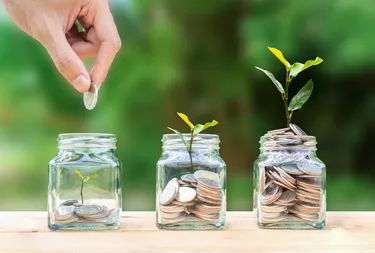
Living beyond your means by using credit cards to pay for everyday expenses soon leads to a situation where you can't pay your bills, much less save anything. The first step to savings is to develop a budget where your income is greater than your outgo. It's a challenge to say no to that new car, vacation or expensive wardrobe and put the money in the bank, but there are advantages.
Savings Can Cover Emergencies
Video of the Day
Emergencies happen to everyone. The car breaks down, the dentist says you need a root canal or the sliding glass door cracks. Having personal savings gives you peace of mind because you know you'll have the resources to cover these emergencies without resorting to your credit cards, or worse, a payday loan. A payday loan is a check you write postdated for two weeks or a month in the future.
Video of the Day
The application fee runs as much as 30 percent of the loan amount. So if you borrow $500, the fee may be as much as $150, which means that you'd write the check to the payday loan company for $650. If you can't pay the loan back in the two-week time period, it's rolled over with another $150 fee.
Savings Can Cover Lost Wages
No one likes to think about the possibility of losing their source of income, but it's a fact of life with the unemployment rate hovering around 3.6 percent at the time of publication. You may receive severance pay if the company is going through a layoff. You may not if the company is going bankrupt or goes out of business.
An accepted rule of thumb is to stash away three months' living expenses in a savings account. These savings cover you in case of prolonged illness where you can't work for several weeks.
Savings Can Earn Interest
Savings don't earn much but they do earn some interest. A bank savings account may earn only a percentage point, while a money market fund earns a bit more and a certificate of deposit slightly more than that. The interest rates fluctuate over time.
Some banks have a no-fee policy if you keep a minimum balance in your checking account. Increasing the balance in your checking account may allow you to avoid paying fees for the account.
Savings Prevent Interest Expenses
By saving for a major purchase and paying for it with personal savings instead of using a credit card, you avoid paying interest. For example, a $1,500 sofa would cost $1,875 at a 25 percent interest rate after a year.
Savings Increase Net Worth
Net worth is the difference between what you owe and what you own. A conservative approach to net worth does not include the value of any real estate, your home and any mortgage against the real estate. Personal assets don't have an effect on your credit score. However, those assets are considered when you're applying for a mortgage or personal loan.
Using some of your personal savings to pay down debt does improve your credit score. Personal savings give you a head start on retirement as well. The earlier you start saving, the greater your fund will be.